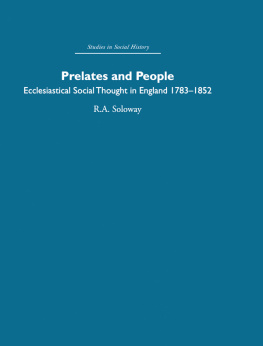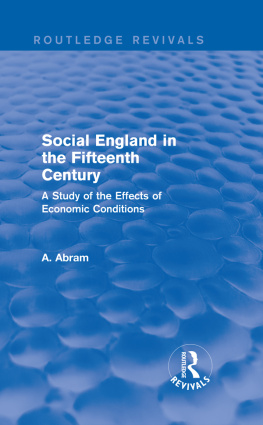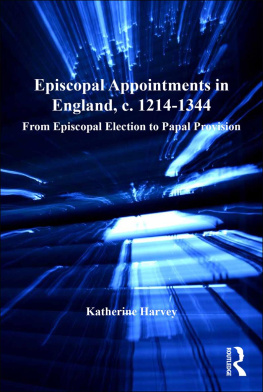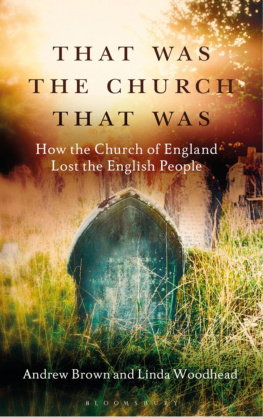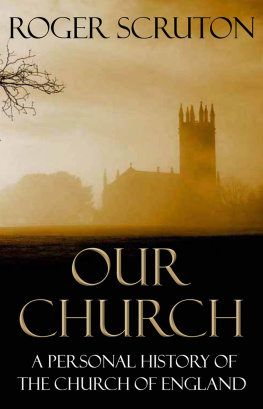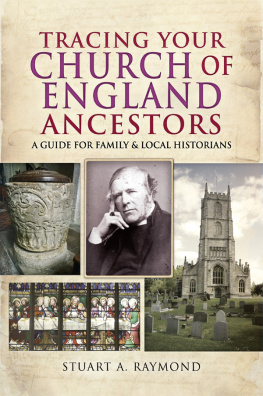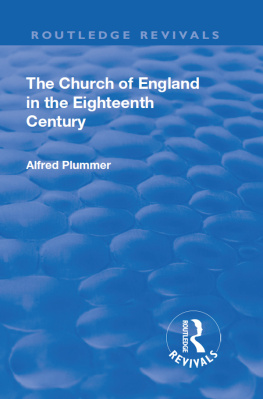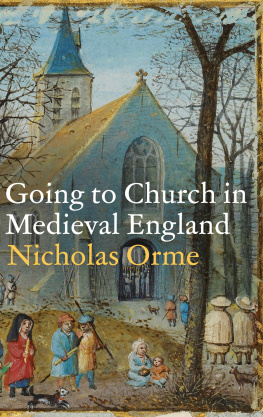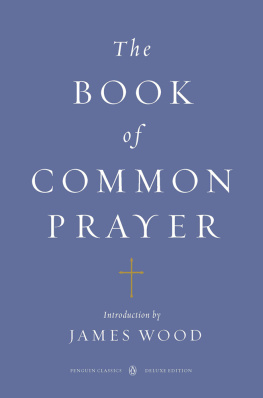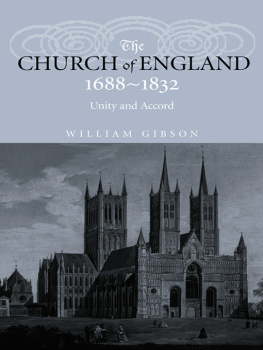STUDIES IN SOCIAL HISTORY
PRELATES AND PEOPLE
First published in 1969
This edition published in 2007 by
Routledge
2 Park Square, Milton Park, Abingdon, Oxon, OX14 4RN
Routledge is an imprint of Taylor & Francis Group, an informa business
Transferred to Digital Printing 2010
1969 R. A. Soloway
All rights reserved. No part of this book may be reprinted or reproduced or utilized in any form or by any electronic, mechanical, or other means, now known or hereafter invented, including photocopying and recording, or in any information storage or retrieval system, without permission in writing from the publishers.
The publishers have made every effort to contact authors and copyright holders of the works reprinted in the Studies in Social History series. This has not been possible in every case, however, and we would welcome correspondence from those individuals or organisations we have been unable to trace.
These reprints are taken from original copies of each book. In many cases the condition of these originals is not perfect. The publisher has gone to great lengths to ensure the quality of these reprints, but wishes to point out that certain characteristics of the original copies will, of necessity, be apparent in reprints thereof.
British Library Cataloguing in Publication Data
A CIP catalogue record for this book
is available from the British Library
Prelates and People
ISBN 10: 0-415-41298-6 (volume)
ISBN10: 0-415-40266-2 (set)
ISBN13: 978-0-415-41298-8 (volume)
ISBN13: 978-0-415-40266-8 (set)
Routledge Library Editions: Studies in Social History
First published in 1969
by Routledge and Kegan Paul Ltd
and in Canada by
University of Toronto Press
Printed in Great Britain
by Cox and Wyman,
Fakenham, Norfolk
R. A. So/oway, 1969
No part of this book may be reproduced
in any form without permission from
the publisher, except for the quotation
of briefpassages in criticism
SBN 7100 6331 8
UTP SBN 8020 1610 3
For George L. Mosse
With gratitude and affection
I am deeply indebted to the staffs of numerous libraries and archives visited in both England and the United States. In particular I owe special thanks to the librarians and archivists at Lambeth Palace, the British Museum, the Bodleian Library and the National Register of Archives. In addition I am grateful for the assistance received in the Public and County Record Offices and the cathedral libraries and diocesan registries mentioned in the Bibliographical Note. Many other diocesan archivists and cathedral librarians carefully answered my written enquiries and were, as a result, most helpful. In this country the staffs of the Widener and Houghton Libraries at Harvard University and of the Newberry Library in Chicago were especially co-operative. I also wish to thank the Earl of Harrowby for his kindness while allowing me access to the Harrowby Manuscripts at Sandon Hall.
Professor Thomas Tentler of the University of Michigan patiently read and re-read most of the manuscript. His criticism was invaluable, and I believe he knows how grateful I am. Elizabeth Sumner was very helpful in preparing the final draft of the book, as was my wife, Maxine, whose interest in Church history, never very keen, has probably been destroyed forever. Professor Peter T. Marsh of Syracuse University in numerous discussions helped me to clarify many ideas, corrected many misconceptions, and taught me much about the nineteenth-century Church. If not enough, he is in no way responsible.
Several faculty research grants from the Horace H. Rackham Fund of the University of Michigan helped offset the expenses of research and manuscript preparation. I am most appreciative.
Richard A. Soloway
Chapel Hill, N.C.
August, 1968


T he reform of the Church of England in the first half of the nineteenth century was moulded considerably by the same pressures of industrialization, urbanization, and population growth that rapidly altered English society and its institutions as a whole. As one of those institutions, legally established, whose bishops sat in Parliament, and whose clergy were expected to support the State in their parochial ministrations, the Anglican Church and its episcopal leadership were particularly sensitive to the transformation of the country that took place from the later eighteenth to the middle of the nineteenth century. Already troubled by a spiritual revival that called attention to the secularity and neglect of their clergy, churchmen in the 1790s were staggered by the upheaval of European-wide revolution that seemed to threaten the very existence of Christian civilization. Even before recovering from that alarming experience, they were compelled to recognize very real institutional as well as clerical weaknesses in the Establishment. These weaknesses became increasingly obvious, and even dangerous, as decade after decade, English society rapidly expanded in ways that made the national Church often appear hopelessly archaic and irrelevant to the needs of an industrial, urban civilization.
This book examines the responses of the episcopal leadership of the Church in England and Wales to the transformation of the society to which they ministered. It considers primarily their social ideas and policies from the decade preceding the French Revolution to the middle of the nineteenth century; from that period when a few bishops began to worry about the effectiveness of their abuse-ridden Church to the time when the Establishment, ecclesiastically reformed and spiritually revitalized, looked forward to evangelizing the diverse multitudes who peopled the new age. By then the Church of England was more episcopal than at any time since the early eighteenth century. Convocation was being revived after 135 years; bishops were resident administrators of their dioceses, overseeing an extensive network of social and religious projects; ecclesiastical discipline was more vigorously enforced, and in Parliament, the Churchs interests were promoted regularly with skill and determination by prelates themselves.
Although much of the reform impetus within the Establishment was generated by the laity, especially in the earlier stages, men like William Wilberforce, Joshua Watson, Robert Peel, and Lord Liverpool were not simply riding roughshod over the objections of reactionary prelates.1 On the contrary, episcopal consultation and co-operation in Church reform was increasingly the rule, not the exception. This does not mean that the bench was usually in the vanguard of reform; many of its members shuddered at the mention of the word. But in each episcopal generation there were important individual bishops who, though deeply conservative, were also realistic men who recognized that the Church was in a new age, faced with challenges demanding unprecedented adjustments on the part of its clergy. Recognition and accommodation to these realities were hardly uniform; but; then few things were in the nineteenth-century Establishment. Parliamentary domination, the lack of a centralized ecclesiastical policy-making body, and the extraordinary independence of the Anglican clergy make it difficult, if not impossible, to discuss collective Church positions. Rarely was there a single Church position; there were usually party positions, or, more commonly, individual positions assumed by individual churchmen.

